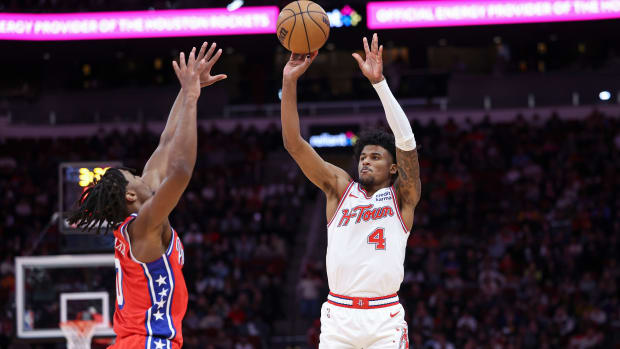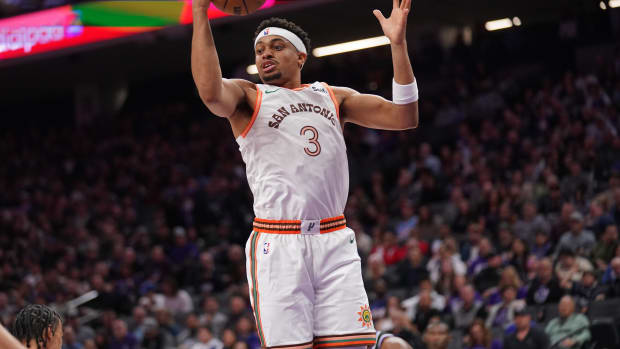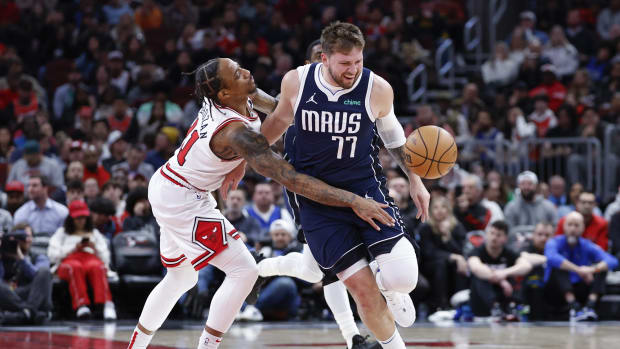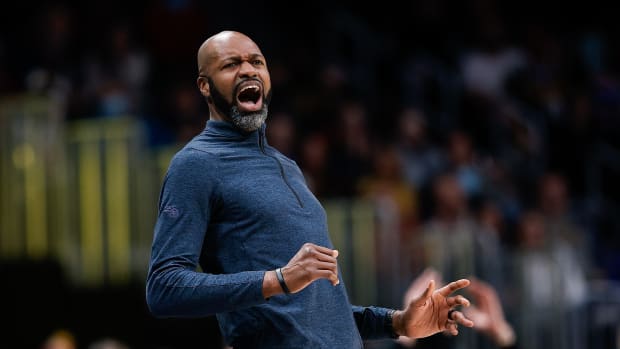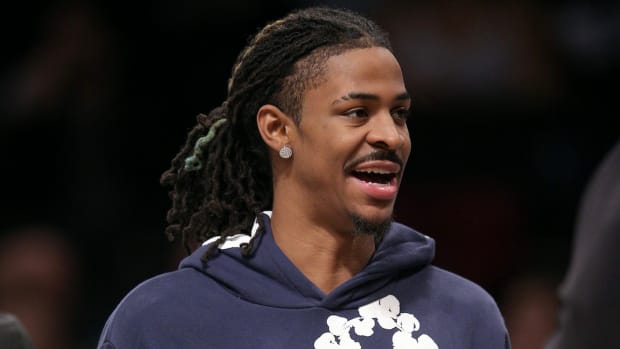Jeff Taylor's suspension for domestic violence presents compelling debate
His profile pales in comparison to Ray Rice or Adrian Peterson, but Charlotte Hornets small forward Jeff Taylor might soon become a household name in the legal debate on athletes and domestic violence.
On Wednesday, NBA commissioner Adam Silver suspended Taylor for 24 games -- 29 percent of the NBA’s 82-game regular-season schedule -- in response to Taylor pleading guilty to misdemeanor domestic violence assault and malicious destruction of hotel property. On Thursday, National Basketball Players' Association executive director Michelle Roberts blasted Taylor’s suspension as “excessive” and “without precedent." She also stressed that the NBPA is ready to help Taylor appeal the suspension, which she believes is inconsistent with the collective bargaining agreement.
But Taylor has decided he doesn't need the NBPA's help. Instead, it was reported Friday that the Hornets forward will serve his suspension and not appeal Silver's decision. The move comes as a surprising twist given Roberts' strong rhetoric in recent days.
What would happen if Taylor changes his mind and does decide to appeal? A grievance arbitrator, who would be neutral and jointly selected by the NBA and players’ association, would have heard the appeal. As explained below, the arbitrator would have been presented with compelling legal arguments from both sides.
The incident in question
Before considering the legal issues of an appeal, it’s worth revisiting the incident that gave rise to Taylor’s suspension. On Sept. 25, officers from the East Lansing (Michigan) Police Department arrested Taylor at a Marriott hotel. The arrest followed a report by hotel guests and staff that Taylor violently pushed a woman, assaulted a security officer and damaged a hotel room door.
The NBA’s investigation, which included interviews with Taylor, Taylor’s victim and key witnesses, revealed that the confrontation stemmed from a screaming argument between an inebriated Taylor and a woman described as his girlfriend. During the argument, Taylor aggressively shoved the woman from his hotel room and into the hallway. The shove was so hard that it propelled her into the door of the room across the hallway. Although she declined medical treatment, she suffered visible injuries to her head and arm.
Legal issues still ahead in the NFL's suspension of Adrian Peterson
Taylor faced three criminal charges under Michigan law, the most significant being misdemeanor domestic violence assault. In response, the Hornets indefinitely suspended Taylor, with pay. In late October, Taylor reached a plea with prosecutors that allowed him to avoid a jail sentence. He agreed to plead guilty to misdemeanor domestic violence assault and malicious destruction of hotel property. In exchange, prosecutors agreed to drop the assault charge relating to the security officer.
On Oct. 29, Michigan District Court Judge Andrea Larkin sentenced Taylor to 18 months of probation. Among other things, Taylor’s probation requires that he complete a domestic violence intervention program, perform 80 hours of community service and submit to daily alcohol tests. Taylor’s plea deal also calls for his domestic violence assault charge to be dropped if he successfully completes probation. If Taylor instead violates the terms of his probation, he would face a possible jail sentence.
Taylor, who was drafted by the Hornets in the second round of the 2012 NBA draft, has missed the Hornets’ first 11 games of the 2014-15 Season. Barring a successful appeal, Taylor will lose slightly under $200,000 in salary as a result of his 24-game suspension. This money would be donated to charity.
Taylor’s first legal argument: CBA doesn’t authorize 24-game suspension
Taylor’s best legal argument is that Silver is simply not authorized to impose a 24-game suspension on a player who pleaded guilty to a misdemeanor domestic violence offense. Article VI of the CBA permits Silver to suspend players for 10 or more games if they are convicted or plead guilty to violent felonies. While Taylor has pleaded guilty to a violent offense, it is a misdemeanor offense, not a felony. This misdemeanor will also be dropped if Taylor completes probation without incident.
The difference between a felony and misdemeanor may seem secondary to the fact that Taylor has pleaded guilty, but Taylor and the players’ association would contend the difference is paramount. This is true for at least two reasons.
Why the NBA won't touch its domestic violence policies anytime soon
First, both sides of a CBA are expected to honor its rules and procedures. A CBA can take months, sometimes years, to negotiate. Every word is scrutinized and every rule reflects debate and compromise. CBA negotiations are also integrated in the sense that a tradeoff by the players' association in regards to one CBA article may be offset against a gain by another. Along those lines, notice how Article VI mentions the word “felony” instead of the phrase “felony or misdemeanor” and instead of a more encompassing word like “crime” or “offense.” This is intentional: the players’ association negotiated a specific limitation on the commissioner’s authority. Taylor and the players’ association would argue that Silver has disregarded that negotiation in punishing Taylor for a misdemeanor.
Second, in law there are crucial differences between a misdemeanor and a felony that illuminate why the players’ association would demand that Article VI be enforced as it is worded. A felony is a far more serious crime than a misdemeanor and reflects significantly worse conduct. A felony conviction is usually accompanied by a jail or prison sentence, whereas a misdemeanor conviction is often resolved by a fine, probation or suspended sentence. The larger point is that the difference between a felony and misdemeanor is considerable and not easily explained away.
The NBA, however, views Article VI in a completely different light. The league regards Article VI as a rule that provides for a minimum 10-game suspension in the event of a violent felony. Article VI, in the league’s eyes, has no bearing on suspensions for other types of player misconduct. In that vein, the NBA does not consider Article VI to be a limitation on the commissioner, but rather a legal assurance that the players’ association can never argue that a violent felony should result in less than a 10-game suspension. Article VI is also not worded to prevent Silver from using other language (namely Article 35 of the NBA Constitution as discussed below) to suspend a player for misconduct.
Taylor’s second argument: Suspension excessive
If Taylor’s 24-game suspension holds, it would become the longest NBA suspension ever for conduct outside an NBA facility and the seventh-longest suspension in the league’s 68-year history. Ron Artest (86 games for role in the Pistons-Pacers brawl), Latrell Sprewell (68 games for choking coach P.J. Carlesimo), Gilbert Arenas (50 games for bringing firearms into an NBA arena), Javaris Crittenton (38 games for bringing firearms into an NBA arena), Stephen Jackson (30 games for role in the Pistons-Pacers brawl) and Kermit Washington (26 games for punching Rudy Tomjanovich) all served longer NBA suspensions, but all of their misconduct occurred within an NBA facility. The record of lengthy suspensions for players' misconduct outside of NBA facilities is limited. As a point of comparison to Taylor receiving 24 games for a misdemeanor, consider that Stephen Jackson was suspended only 7 games in 2007 after he pleaded guilty to felony criminal recklessness for firing a gun outside a strip club. To be clear, this discussion is about suspended NBA players, not players permanently banned from the league for drugs and alcohol abuse or point shaving.
• Play FanNation's new NBA games:Fast Break | BasketballThrowdown
A 24-game suspension also far exceeds any other NBA or NBA team suspension for domestic violence. The Boston Celtics suspended forward Jared Sullinger for one game in 2013 after domestic violence charges against him were dropped. Sullinger had admitted to Celtics president Danny Ainge that he could have used better judgment in an incident with his girlfriend. More relevantly, the NBA suspended Sacramento Kings guard Ron Artest for just seven games in 2007 after he pleaded no contest to a misdemeanor domestic violence charge.
While Taylor clearly engaged in wrongful conduct, should a misdemeanor warrant the longest NBA suspension ever for conduct that takes place outside an NBA facility? And why should Taylor receive more than three times the length of suspension that Artest (a repeat offender) received when both were punished for a misdemeanor domestic violence charge?
Taylor’s third argument: No record of misconduct and a first-time offender
Taylor is a second-year NBA player and does not, according to public records, have a history of misconduct. He’s the son of a former NBA player (also named Jeff Taylor) and was born and raised in Sweden. Taylor then attended high school in Hobbs, New Mexico and played four years at Vanderbilt University. Until the domestic violence incident this year, the 25-year-old appears to have lived a law-abiding lifestyle in both the U.S. and Sweden. Also, although not necessarily relevant to the issue of domestic violence, there are no published accounts of Taylor being difficult to coach or a bad teammate. He seems to be a fairly ordinary person who plays in the NBA.
None of this is to diminish Taylor’s misconduct and it is worth stressing that domestic violence often goes unreported. Still, the absence of Taylor having a negative history raises the possibility that his act of domestic violence may have been an isolated incident rather than part of a broader pattern of behavior.
Along those lines, there is a viable argument that the suspension should be issued against a player who has made repeated mistakes. In law, so-called “repeat offenders” tend to receive longer punishments because it appears they did not learn their lesson the first time. While the NBA is not obligated to give a first-time offender a break, courts often do.
NBA’s first legal argument: Suspension authorized
While the players’ association will stress the limiting language of Article VI of the CBA, the NBA will likely stress the more expansive language of Article 35 of the league’s constitution. Article 35 authorizes Silver to suspend players for any “conduct that does not conform to standards of morality or fair play, that does not comply at all times with all federal, state, and local laws, or that is prejudicial or detrimental to the NBA.” Taylor pleading guilty to breaking Michigan law clearly falls within the reach of Article 35. Plus, Article 35 imposes no limit on length of suspension. This means that Silver’s choice of 24 games for Taylor’s suspension is permissible under Article 35.
NBPA director: Owners are expendable, players are not
Is Article 35 a legal “slam dunk” for the NBA? Not necessarily. Attorneys for the players’ association would contend that when the CBA and Constitution can both apply, the CBA should trump the Constitution. The CBA reflects agreement by both the players’ association and the NBA, whereas the Constitution is a league-drafted document. But in fairness to the NBA, Article 35 of the Constitution is specifically referenced and incorporated into the collectively-bargained Uniform Player Contract. From that perspective, use of Article 35 would not “trump” the CBA since Article 35 is incorporated into the CBA.
There isn’t much precedent to rely on in handicapping these issues. The NBA has seldom used Article 35, and not once in the context of domestic violence when a player's suspension exceeds 7 games. The league has typically used Article 35 to punish the players mentioned above for various acts of misconduct within an NBA facility. The appropriateness of using Article 35 to impose a 24-game suspension for a misdemeanor when Article VI provides for a 10 or more game suspension for a felony could trigger a lively debate before the grievance arbitrator.
NBA’s second argument: Taylor’s punishment reflects a change in society’s concerns
Sources familiar with the NBA’s legal strategy indicate that the league is confident it would prevail over an appeal by Taylor. This is in part because of how Silver and his advisors treated the Taylor incident. As he did following Donald Sterling’s infamous recording, Silver launched a thoroughly detailed and confidential investigation into Taylor’s domestic violence. Silver, an attorney by trade, retained a team of former prosecutors to interview witnesses and evaluate available evidence. Silver also consulted with domestic violence experts to better assess Taylor’s behavior in a broader context. The NBA is light years ahead of any other league at legal investigations. This is meaningful since the grievance arbitrator would accord greater deference to the NBA’s judgment if the league shows it was comprehensive and fair.
The NBA would also stress that the issue of domestic violence in sports has changed dramatically over the last year. The NBA would maintain that society has become far more concerned about domestic violence and society demands that athletes be held accountable. Consider the public’s hostile reaction to Rice receiving only a two-game suspension despite clear video of him dragging his then fiancé (now wife), Janay Palmer Rice, across the floor of the Revel Hotel and Casino in Atlantic City, N.J. The NBA has a fiduciary and moral duty to avoid the public losing confidence in it as it has in the NFL.
NBA’s third argument: Standard of review is highly permissible to the NBA
In hearing an appeal by Taylor, the grievance arbitrator would apply an “arbitrary and capricious” standard of review. This standard is extremely deferential to the NBA. It means that so long as there is a mere rational connection between Taylor’s misconduct and a 24-game suspension, the NBA and Silver would prevail. The NBA would stress the arguments raised above as easily evidencing a rational connection. For his part, Taylor would insist the NBA lacks textual support to impose a 24-game suspension and, on a whim by Silver, has misapplied its own disciplinary rules.
Standard of review could prove the deciding factor in an appeal by Taylor and it would greatly favor the NBA.
Going forward: Will the NBA adopt a new domestic violence prevention policy?
In an interview with SI.com in October, Michele Roberts signaled reluctance to negotiating a new domestic violence policy before the next round of CBA discussions. The NBA appears reluctant as well. The league has already seen problems for the NFL in adopting a bright-line six-game suspension for domestic violence. Each incident involving an athlete and domestic violence is different, and lends itself to a case-by-case approach.
Michael McCann is a Massachusetts attorney and the founding director of the Sports and Entertainment Law Institute at the University of New Hampshire School of Law. He is also the distinguished visiting Hall of Fame Professor of Law at Mississippi College School of Law.






























